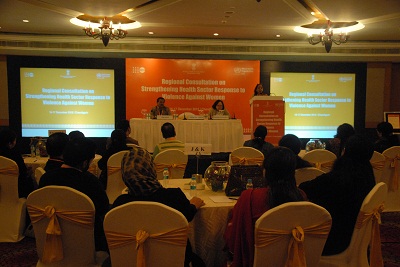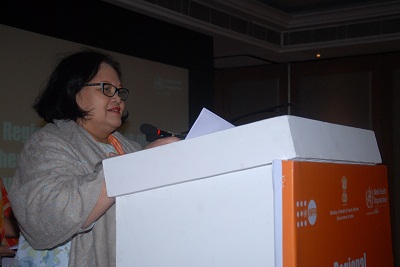
WHO Country Office for India in collaboration with the Ministry of Health & Family Welfare (MoHFW) and United Nations Population Fund (UNFPA) convened a regional consultation at Chandigarh to build capacities of states for implementation of Health Ministry’s ‘Medico-legal guidelines and protocols for survivors’/victims of sexual violence’, at the facility level.
The objective of the consultation was to bring the states together to identify key challenges, constraints and gaps in strengthening health system’s response to improve access to and coverage of health services for victims of sexual violence. It was also aimed at taking stock of the current practices as also to enhance the understanding of these guidelines among medical counterparts in states and build their skills for implementing them.
Presiding over the function, Mr Oma Nand, Director of Hospital, Mental Health and Trauma, MoHFW commended the states for recognizing violence against women (VAW) as a critical public health issue and urged them to implement these guidelines.
“Capacities of health workforce need to be built further to provide quality services to women victims/survivors of sexual violence,” he added.

Welcoming the recent political momentum in India for addressing violence against women, Dr Prakin Suchaxaya, Coordinator Health Programmes, WHO Country Office for India said, “Now is the time to effectively implement the guidelines developed by the Health Ministry.”
Dr Suchaxaya also urged the participants to develop a practical and concrete action plan to apply the learnings from this consultation in strengthening their on-going work on prevention of and response to VAW.
In his remarks, Dr Toshihiro Tanaka, Deputy Representative of UNFPA urged that violence against women should end and women should live with integrity and dignity.
The consultation was organized for the states of Jammu & Kashmir, Haryana, Himachal Pradesh, Punjab, and Chandigarh. These guidelines are based on WHO guidelines on Medico-Legal Care (2003) and Clinical Policy Guidelines for responding to intimate partner violence (IPV) and sexual assault (2013) and are critical to bringing about uniformity in approaching, treating and documenting cases of sexual violence against women in India.
WHO expressed its commitment to provide ongoing technical support to the government in institutionalizing its medico-legal guidelines.
The workshop was attended by representatives from MOHFW, state health departments, district hospitals (medical officers, obstetricians and gynaecologist, psychiatrists, forensic scientists, health administrators), police department, civil society organizations and other UN partners.
